Middle Class Blues
Matt Yglesias points to a new Pew survey of middle class America which finds a record number feel they are economically worse off than they were five years ago.
A majority of survey respondents say that in the past five years, they either haven’t moved forward in life (25%) or have fallen backwards (31%). This is the most downbeat short-term assessment of personal progress in nearly half a century of polling by the Pew Research Center and the Gallup organization.
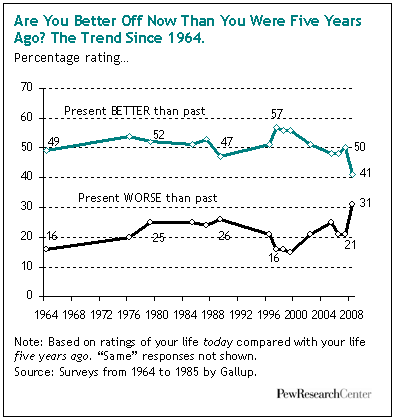
The Politics of Economic Discontent
Matt observes that,
Politically, it’s a bit tricky since the salient trend is the dramatic narrowing of the better/worse gap, but the betters still outnumber the worses. You want to tap into the sentiments of the growing “worse” bloc, but still can’t let that kind of sentiment dominate what you’re saying since there are all these “betters” out there still.
But, as a commenter retorts, “[W]hen Reagan used that line to such (apparent) great effect, the split was 52-25. With 31% saying they’re worse off, many more than that will have friends or family who are part of the 31%. I don’t think it’s tricky politically at all.” I tend to agree.
The bizarre thing, as I’ve noted before, is that it’s obvious to anyone who lived through both eras that the economy is much better now than it was then. In 1980, we were in a recession that stretched for the better part of a decade, experiencing double digit inflation and interest rates, high unemployment, and a Dow that was well under 1000.
Jimmy Carter used the Misery Index, which added inflation and unemployment, to great effect against Gerald Ford in 1976. Ronald Reagan returned the favor in 1980. Here’s where it was:
Here’s where it’s been for the last year (February’s numbers are the latest I have available):
The Rich Get Richer — And So Do Everyone Else (But Not as Fast)
The poll’s Executive Summary does a good job of analyzing the data and giving some clues as to why people are so miserable in both their short-term assessments and their predictions for the future. Essentially, it’s a classic case of relative deprivation. We’re living in bigger houses, on average, than ever before. We’ve got technological luxuries that were unobtainable five or ten years ago. But the upper classes are growing at a faster rate than the lower and middle classes so, despite the absolute gains in living standards, they feel like they’re falling further behind even while their lives are improving. Additionally, the “middle class anchors” of housing, education, and health care are getting rapidly more expensive, belying the relative lack of inflation.
The New Economy – Winners and Losers
Two charts from the survey also provide useful insights.
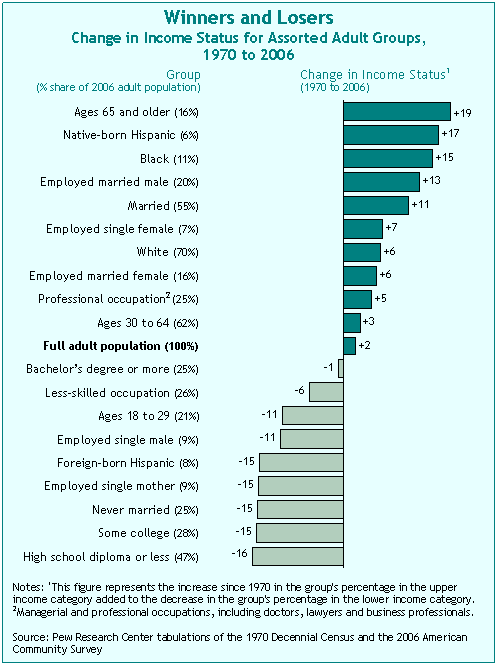
Winners include seniors (ages 65 and older), blacks, native-born Hispanics and married adults. The income status of all of these groups improved from 1970 to 2006. Losers include young adults (ages 18 to 29), the never-married, foreign-born Hispanics and people with a high school diploma or less. All of these groups have seen their relative income positions decline.
This is actually pretty good news. The classes who were the object of concern a generation ago, the elderly and minorities, are doing much better. And so are those who make good choices: Getting an education, getting married, and postponing giving birth the children until they get married.
This also underscores a point demonstrated by a second chart:
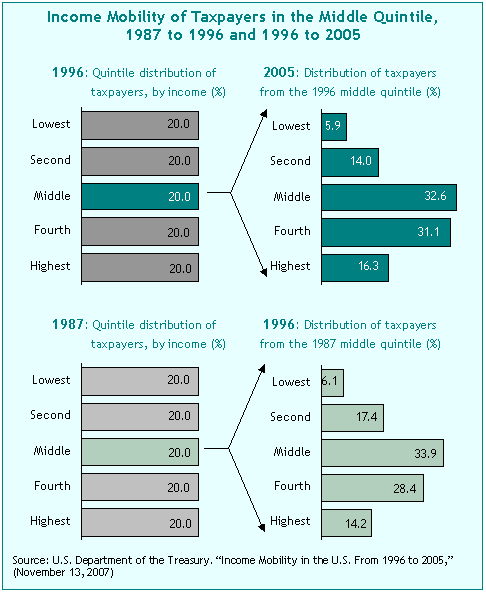
A 2007 study by the U.S. Treasury Department found that about half of all taxpayers are in a different income quintile from the one they had been in a decade earlier. It also found that the highest levels of churn occur in the middle income brackets. The chart below illustrates, for two consecutive nine-year periods, where taxpayers who were in the middle income quintile at one point in time wound up nine years later. It shows that, in each time period, roughly two-thirds of the middle quintile taxpayers were in a different quintile after nine years.
To be sure, much of this is owing to “life cycle effect,” the propensity for people to earn higher incomes as they advance in their careers. But that, too, is a good thing. It belies the notions of a static economy that discussions of social class and comparisons of wealth gaps reinforce. People who make good choices have an excellent shot at moving up the ladder. That’s as it should be.
Politically, of course, little of this matters. Similarly, As Jimmy Carter discovered, once to his advantage, once not, people will give the president (or his party) way too much credit or blame for the state of the economy. Similarly, if people think they’re falling behind or think they’re trapped in place, they’re going to vote that way regardless of the reality. But ignorance and irrationality doesn’t change the underlying facts.
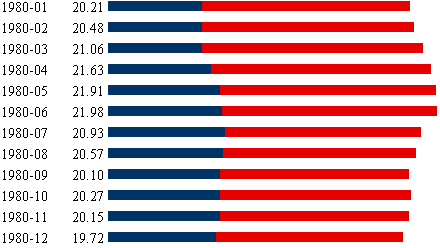
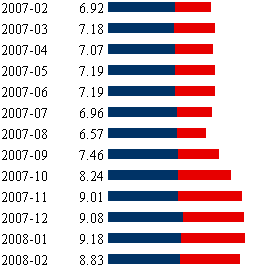



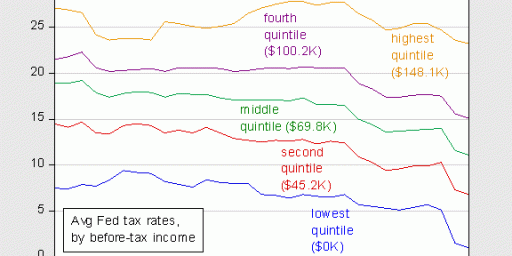

Another interesting measure is comparing today’s stats to those of 1996. The unemployment rate, number of discouraged, and so on are all quite similar. In 1996 an optimistic attitude prevailed; in 2008 the opposite.
I think the difference in attitude reflects a number of factors: 1) George Bush is a simply awful spokesman for the economy (or much of anything else); Bill Clinton was a good one; 2) the general tone of the news these days is pretty downbeat (realistically so); 3) the gap between the to .1% and everybody else is pretty darned high; 4) the total amount of wealth controlled by that top .1% is pretty darned high, too.
Those last two don’t reflect envy on my part (I honestly don’t give a damn) just reality. I do think that the gap between the very rich and everybody else is damaging socially and politically.
A small nit: saying that getting married is a “good choice” sounds a but judgmental to my ears. I assume you just mean that statistically married people earn more or something? Thanks.
Nice exposition on the data from the Pew survey. Unfortunately, only the “income†side of the “Middle Class Blues†is presented. Two data points are missing: Incurred debt and its “service†and fixed expenses (housing, food, health insurance, etc.). If you add these latter two, and subtract them from income you get income available for discretional spending.
You do not have to be an economist to understand that income available for discretionary spending is a true measure of “wealthâ€.
Two indices point to the malaise that afflicts our society: The rise of middle class debt service, and the rise in health insurance costs. Both have increased at a faster rate then earned income. Both can be measured by the disasters they cause: a rise in individual bankruptcy proceedings, and a rise in the number of families without health insurance.
You are quite right in you’re your last sentence in this post: â€But ignorance and irrationality doesn’t change the underlying facts.â€You cannot fudge the fact that for many income available for discretionary spending has steadily decreased. Good by to the weekly trip to the movie house, good by to the splurge at the restaurant, and good by to that long drive to the “free†beach… It is called the Middle Class Blues.
When your bills increase faster than your salary you are likely to say that you are worse off than you were five years ago. If your largest investment (your home) has lost considerable value simultaneously you are even more likely to say you are worse off.
BTW the unemployment rate is calculated differently now than it was in 1980.
I am definitely middle-class (barely) and I am much better off today than I was at anytime in the past 10 years. Having said that, my growth in income has slowed over the past few years while my bills have increased at a faster rate so it seems that things are getting worse. But on reflection, the increase in my bills are largely due to choices I have made while I have declined offers of higher earnings, all designed to provide the life style I want.
I am willing to bet that those who said they are worse off now than 5 years ago are probably comparing where they expected to be today as opposed to where they actually are compared to five years ago.
Well, it is a judgment. Being married is almost always a smart economic choice, unless you’re Paul McCartney. And I say that as someone who married late to a woman who married late, both for the first time, and both of whom were relatively successful beforehand.
I’m sure there are “many” for whom that is true. It’s also true that, on aggregate, people are going to the movies, eating at restaurants, and going on weekend trips more often than in the past. This is especially true of restaurant eating which, thirty years ago, was a luxury and is now something most people do without thinking. And we’d be going to the movies even more if it weren’t for our large screen TVs and DVD players.
As Grewgills points out, it is quite inaccurate to compare the misery index today with that of 1980. Both unemployment and inflation are calculated very differently today. If you were using the 1980 method of calculating inflation, it would stand today at around 10-12%. If you used the old means of calculating unemployment, that figure would stand at at least 9%. Using this comparable method, today’s misery index is well within the 1980 range.
Not to be argumentative Mr. Joiner, but a short reply… If you will not accept the thesis that income is not an expression of wealth unless it is it is indexed to “discretionary spendingâ€, perhaps you will consider the concept of income inequality as an index of “Middle Class Bluesâ€.
Enlightening is a paper by Kopczuk et all (Columbia University and National Bureau of Economic Research) which is in PDF form and can be captured by simple Google search utilizing part of the title “Uncovering the American Dreamâ€
I am not an Economist, but as my Pappy used to say: “Data speaks for itselfâ€. Income inequality is increasing, and the middle class is being squeezed. Those that fail to recognize and offer relief to “Middle Class Blues†will be bruised in the upcoming elections. We all know what colors are commonly found in a bruise…
Simplistic, shallow analysis, selective presentation. Sorry James, but you’ve gone out and found data that – in some places – fits your personal viewpoint – but you really don’t know what’s going on.
Here’s a hint: the sense of prosperity or lack thereof has nothing to do with media coverage or presidential demeanor. You could have been able to smell the bullsh*t in those chestnuts before they ever escaped your keyboard.
Perhaps you should read The Great Risk Shift by Jacob Hacker.
Our Paul is on the right track.
The data are all from the same survey that reported the findings, with the exception of the “misery index” scores, which are from the Statistical Abstract of the U.S. (Census Bureau data, that is).
There’s simply no question that middle class Americans are living much more prosperous lives than they were even when I was a kid. We live in bigger houses, drive more luxurious cars, have more toys, eat out at restaurants more often, have more clothes, etc., etc.
The difference is that we’re now comparing ourself to even richer people so it seems like we’re falling behind. In the early 1970s, there were like 6 billionaires on the planet; now, they’re relatively commonplace.
Further, unskilled labor hasn’t fared well in the Information Age. There aren’t many assembly line jobs anymore and most don’t pay what they did. And most manual labor jobs have been supplanted by machines. Heck, outside New Jersey, you can’t even get a job pumping gas anymore.
So, you’ve got a lower class that’s worse off, a middle class that’s much better off but see the rich further off into the distant, and a top 1% that’s off the charts. But, again, those groupings are dynamic.
Two comments. First, I wouldn’t trust a survey like this anymore. Democrats will tell you they’re worse off, no matter what, and Repubs will say the opposite. Politics has spoiled all of this.
Secondly, according to this report on income mobility, 1995-2006 (http://www.treas.gov/offices/tax-policy/library/incomemobilitystudy03-08revise.pdf)
— most taxpayers who began in the bottom quintile moved up to a higher income group within 10 years. (in other words, most of the poorest moved up toward the middle class)
— 75% of those in the top 0.01% of taxpayers in 1996 were no longer in that category in 2005 (in other words, most of our richest slipped back closer to the pack)
— median incomes of all taxpayers increased by 24 percent after adjusting for inflation. Actual incomes increased for two-thirds of all taxpayers over this period. (in other words, most Americans are doing better)
So basically, the idea that “the rich get richer while the poor get poorer†is simply not true. Nor is the idea that we’re not living as long.